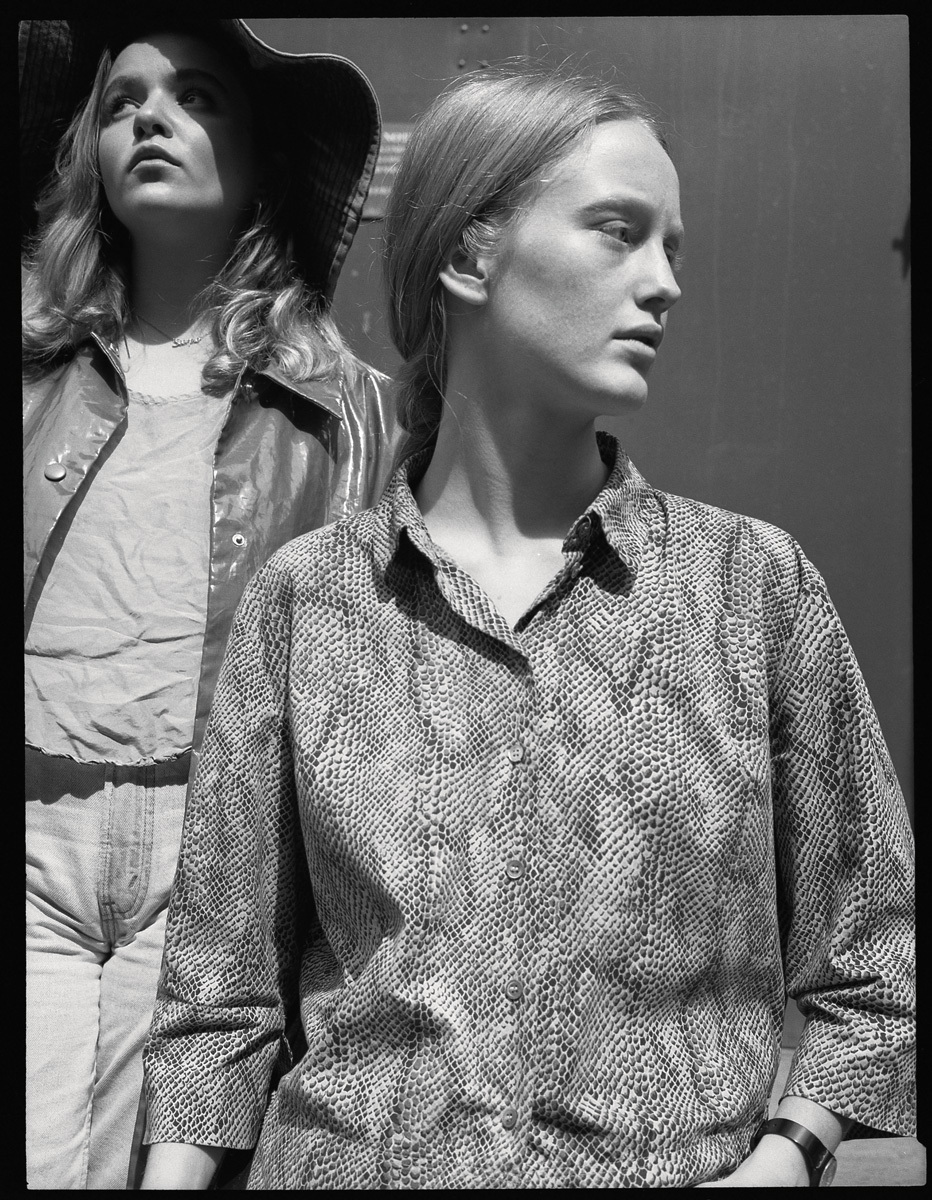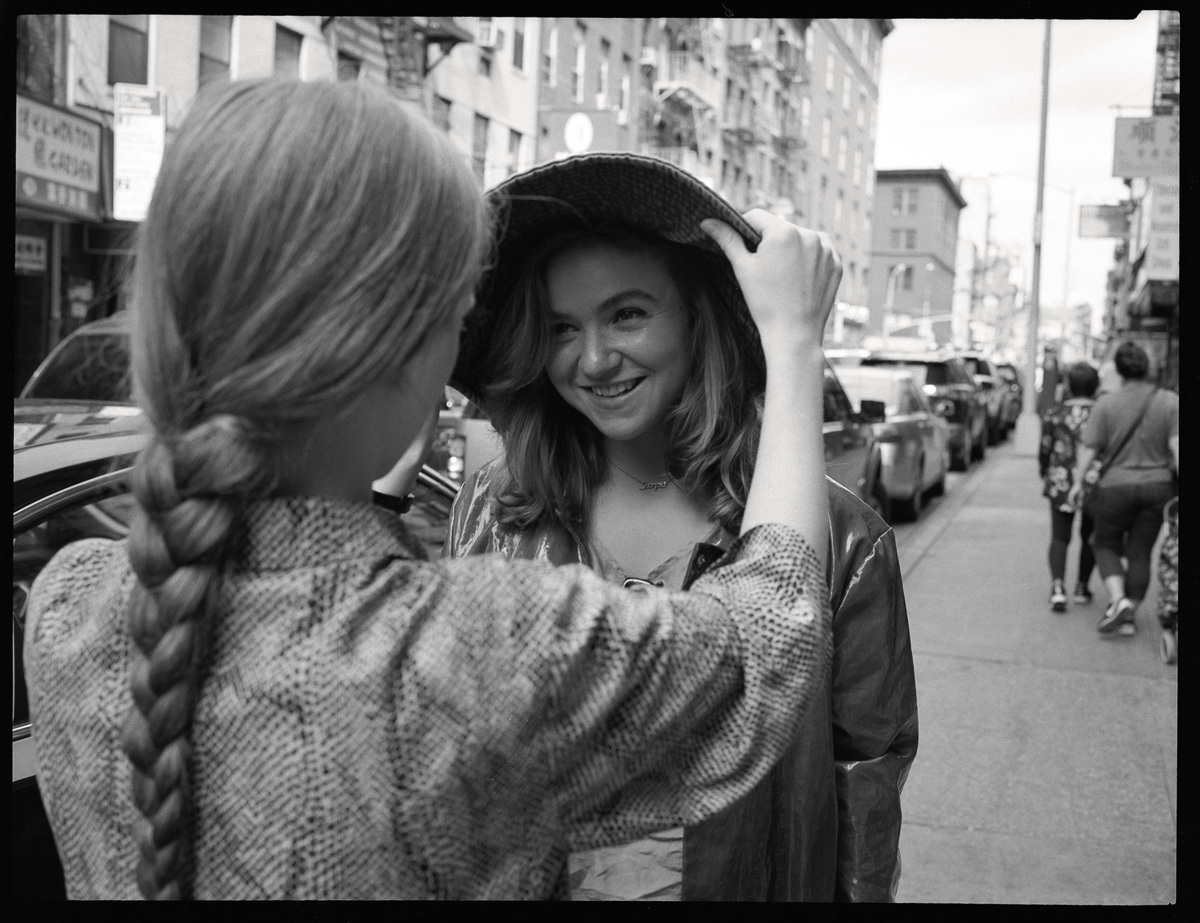“Katie is definitely a bit of a Becky,” laughs India Salvor Menuez, the artist and actress who plays one half of a privileged caucasian, middle class duo spending the summer vacation in an ungentrified corner of New York in White Girl. In the film, Elizabeth Wood’s debut feature, Leah (played by Homeland‘s Morgan Saylor) and Katie (played by Menuez) find a place to rent in Queens for the summer, and invite the young Puerto Rican drug dealers from the block in to party, smoke, and have sex. “It’s not entirely her fault,” India explains, of her character’s privileged ignorance, which extends to blithely wondering if the Puerto Ricans might steal her camera if left alone in the room. “A sheltered upbringing pre-NYC instills the kind of moderate racism she expresses,” she continues. “She shares the same fear of people of color as many others from the white suburbs of America.”
White Girl‘s protagonist Leah spends her first summer away from Oklahoma having a massive blow out. She falls for Blue (Brian Marc), one of the Puerto Rican drug dealers. She interns at a style magazine; her boss entices her into sex with cocaine. She takes to the drug hard, eventually persuading her new boyfriend to deal to her new connections in Manhattan’s media world. The film’s title refers to the white stuff — a major player in the narrative — as much as to the color of Leah’s skin. When Blue gets arrested on a drugs charge Leah is left holding a brick of coke with a boyfriend to get out of jail and a dealer looking for his money’s worth.
At this point, sophomore liberal arts student Leah might read as a little naïve but that’s exactly the kind of trap writer/director Elizabeth Wood is interested in leading the audience into. White Girl explores the protagonist’s privilege and how she is able to negotiate and access a world where her Puerto Rican boyfriend can’t, once she gets involved in looking for a lawyer to represent him and selling the drugs herself. The film also — through her encounters with older, straight white men — shows that white girl privilege can be easily trumped. “I appreciate how the film also demonstrates the ways in which their white privilege often hits the wall of patriarchy,” India says. “Where their freedom as women is limited by the freedoms of the white men around them.”
For Morgan, famous for playing Dana Brody in Homeland, taking the role meant portraying a character that was complex and, a lot of the time, pretty unlikeable. “It was different to most scripts I’ve read,” the 21-year-old actress says. “It felt like it was discussing issues that my peers and I think are important, in a raw and gnarly setting. I also loved seeing a female lead that was messy and complex.” When Leah and Katie move into Ridgewood, there’s a sense they are both naïve and arrogant, thinking they can just make the cheaper neighborhood work to their advantage. Morgan agrees, but adds that also they’re really just young kids. “They are figuring out who they want to be.”
In its gritty depiction of life in New York, White Girl visually echoes Larry Clark’s seminal 1995 film Kids. Producer Christine Vachon even worked on both movies. The film was a reference point for Wood, who, like Kids scriptwriter Harmony Korine did before her, based the story on her own experiences in New York, which she’s said were much crazier. But it’s the pairing of a debut female director with two young female leads that proves to be the igniting force of White Girl. The film is casually sexually explicit but in Elizabeth’s hands, the nudity never feels exploitative. Even though Leah exploits others by using her sexuality and in turn, is exploited, for the actress playing her the sex scenes were not as challenging as may be presumed. “I can’t imagine doing them with anyone other than Elizabeth,” Morgan explains. “We spent a lot of time together before shooting discussing the scenes, figuring out how the character felt in them, and how to shoot them. It felt really important to have a female voice behind such a female story.”
Morgan and India both call New York home, though Morgan spends a lot of time in Chicago where she is majoring in math at university. In White Girl, the girls’ education comes at a price to themselves but mostly to others. Their privilege gets them off the hook and hangs others out to dry. “Leah is beginning to be aware of her privilege, for the first time in her life,” says Morgan of her character. “The way she grew up didn’t show it to her, but I think by the end of the film she is starting to understand her place in society, as a young white girl. She is able to recognize she lives a different kind of life than many people, simply because of her innate white female privilege.”
For India, it’s the complications of White Girl that prove most interesting. “It is very much a story of people taking advantage of every possible situation. Leah does things and you don’t know why, things happen to her and it’s not explained why, you don’t see if there will be consequences at all for anyone other than Blue. Every time I’ve watched the film I end up feeling pretty fucked up, but I like that because it doesn’t feel gratuitous — it motivates me to keep investigating; to think what happened and why?”

Credits
Text Colin Crummy
Photography Zora Sicher
Hair and makeup Karla Hirkaler
Morgan and India wear all clothing model’s own.
